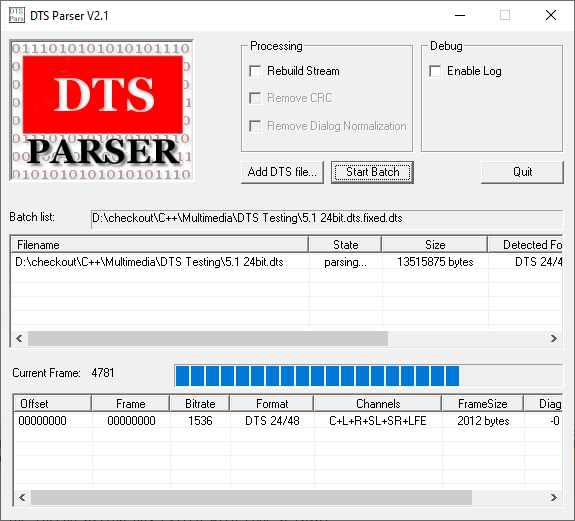Table of content
1 DTS-parser
1.1 Introduction
1.2 DTS streams
1.3 A generic bitstream parser
1.3.1 DTS WAV
1.3.2 Regular DTS
1.3.3 End of stream
1.4 The DTS parser
1.5 A generic bitstream writer
2 Notes about the Visual Studio project
DTS is a famous audio format used in many places (DVD, Bluray, CD) allowing multichannel audio at high quality.
The 1.2.1 specification is available in PDF at ETSI and it is called ETSI TS 102114: DTS Coherent Acoustics; Core and Extensions
This project demonstrate how to parse such format. It is not about decompressing the audio. It provides a generic bitstream reader and writer that you can use for other formats (MP2, MP3, AC3...)
This is an old C++ project based on MFC, made around 2006. I updated it to Visual Studio Community 2019.
DTS can be delivered in many forms:
- As a regular bitstream: each frame start by 0x7FFE8001
- As a WAV file containing a Big Endian 14 bit bitstream: each frame start by 0x1FFFE800
- As a WAV file containing a Big Endian 16 bit bitstream: each frame start by 0x7FFE8001
- As a WAV file containing a Little Endian 14 bit bitstream: each frame start by 0xFF1F00E8
- As a WAV file containing a Little Endian 16 bit bitstream: each frame start by 0xFE7F0180
The class BitStreamReader is a general purpose bitstream reader. You can use it to read 1 or more bit from any file.
If the file is a WAV, the class WAVReader will be used under the hood to load each buffer.
The WAV reader rely on the vintage Windows Multimedia API (mmioOpen,mmioRead,mmioSeek,mmioClose).
- If the DTS WAV is in 16 bit format, we just pass the data to
BitStreamReader"as is" withmmioRead - if the DTS WAV is in 14 bit format, we must reconstruct the 16 bit format before passing the data the
BitStreamReader. In this case we use an intermediate private bufferm_buffer
Here is the method WAVReader::ReadDTSStream taking care of all of this:
long WAVReader::ReadDTSStream(unsigned char *buffer, long length)
{
int count = 0;
if (m_16_bit_mode)
{
count = ReadWAVStream((char*)buffer,length);
}
else
{
short *ptr=(short*)m_buffer;
while (count!=length)
{
if (b==-1)
{
if (m_buffer_pos>=m_buffer_size)
{
long r = ReadWAVStream(m_buffer,m_buffer_size*2);
if (r<=0)
return -1;
m_buffer_pos = 0;
}
v = (ptr[m_buffer_pos++] & 0x3FFF) ; // 14 bits DTS data
b = 13;
}
short mask = (1<<b);
short bit = v & mask;
if (bit)
{
unsigned char bmask = (1<<bitpos);
outchar |= bmask;
}
bitpos--;
b--;
if (bitpos==-1)
{
*buffer++ = outchar;
count++;
outchar=0;
bitpos = 7;
}
}
}
return count;
}BitStreamReader read the file using fopen_s in binary mode. We use an internal byte buffer called m_bitbuffer. Its size is fixed at 2048 bytes and stored in m_bitbuffer_size.
The state of the reader is based on two variables:
m_bytepos: when it is equal to 2048, it is time to load another bufferm_bitpos: It start at 7 and decrease to -1. When it is equal to -1, it is time to incrementm_bytepos
There is also a m_bitcounter storing how many bit we have read. So reading bit by bit the stream looks like this:
int BitStreamReader::ReadBit()
{
if (m_bitpos==-1)
{
m_bytepos++;
if (m_bytepos == m_bitbuffer_size)
{
LoadBuffer();
}
m_bitpos = 7;
}
int mask = (1<<m_bitpos);
int bit = m_bitbuffer[m_bytepos] & mask;
m_bitpos--;
m_bitcounter++;
if (m_bitpos==-1)
{
m_bytecounter++;
}
if (bit!=0)
return 1;
else
return 0;
}From this method we can now provides another one to read multiple bits:
unsigned int BitStreamReader::ReadBits(int count)
{
unsigned int v=0;
unsigned int bit = 0;
for (int b=0;b<count;b++)
{
bit = ReadBit();
v = (v<<1) | bit;
}
return v;
}We raise an exception EOFBSException when the end of the stream is reached.
The code is located in method CDTSParserDlg::ParseDTS, it simply follows the DTS spec:
int sync = m_bitstr.ReadBits(32);
if (sync != 0x7FFE8001)
{
break;
}
//
// Read the frame header
//
int ftype = m_bitstr.ReadBit();
int short_ = m_bitstr.ReadBits(5);
int cpf = m_bitstr.ReadBit();
int nblks = m_bitstr.ReadBits(7);
int fsize = m_bitstr.ReadBits(14);
int amode = m_bitstr.ReadBits(6);
int sfreq = m_bitstr.ReadBits(4);
int rate = m_bitstr.ReadBits(5);
int mix = m_bitstr.ReadBit();
int dynf = m_bitstr.ReadBit();
int timef = m_bitstr.ReadBit();
int auxf = m_bitstr.ReadBit();
int hdcd = m_bitstr.ReadBit();
int ext_audio_id = m_bitstr.ReadBits(3);
int ext_audio = m_bitstr.ReadBit();
int aspf = m_bitstr.ReadBit();
int lff = m_bitstr.ReadBits(2);
int hflag = m_bitstr.ReadBit();
int hcrc = 0;
if (cpf == 1)
hcrc = m_bitstr.ReadBits(16);
int filts = m_bitstr.ReadBit();
int vernum = m_bitstr.ReadBits(4);
int chist = m_bitstr.ReadBits(2);
int pcmr = m_bitstr.ReadBits(3);
int sumf = m_bitstr.ReadBit();
int suls = m_bitstr.ReadBit();
int dial = m_bitstr.ReadBits(4);We also provides a class BitStreamWriter to write any bitstream you want (You can't write DTS WAV with it).
Writing a bit is pretty much similar to reading a bit. The state of the writer is based on two variables:
m_bytepos: when it is equal to 2048, it is time to write the current bufferm_bitpos: It start at 7 and decrease to -1. When it is equal to -1, it is time to incrementm_bytepos
Here the code:
void BitStreamWriter::WriteBit(int value)
{
int mask = 0;
if (value==1)
{
mask = 1<<m_bitcount;
}
m_bitbuffer[m_bytepos] |= mask;
m_bitcount--;
if (m_bitcount==-1)
{
m_bitcount = 7;
m_bytepos++;
if (m_bytepos==m_bitbuffer_size)
{
SaveBuffer();
}
}
}Of course when the stream is closed we must flush the remaining bytes in the buffer:
void BitStreamWriter::Close()
{
if (m_bitcount!=7)
{
SaveBuffer(); // flush the remaining bits to disk
}
if (m_id!=NULL)
{
fclose(m_id);
m_id=NULL;
}
}Unicode is disabled as precompiled headers
